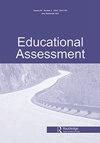学科知识在评估中的表现:高中和大学科学、数学和人文评估与成功预测因素的关联
IF 2.3
Q1 EDUCATION & EDUCATIONAL RESEARCH
引用次数: 2
摘要
摘要在本文中,我们对各种高中科目的评估类型进行了探索性调查,这些评估类型最能预测这些科目在大学的成功。在社会科学和人文学科中,内部(基于学校的)评估比外部的基于考试的评估更能预测大学的成功,而数学和科学则相反。对这些发现的一个合理解释是,在大学转型期认识到学科知识结构差异的评估方法可能是更好地为学生在大学取得成功做好准备的一个重要因素,这也值得进一步研究。还有其他合理的解释,我们也在探索。如果进一步的研究验证了我们关于调整学科学习和评估的重要性的猜测,我们将发现一种潜在的强大机制,可以利用评估的动力来增强学习。本文章由计算机程序翻译,如有差异,请以英文原文为准。
Representations of Disciplinary Knowledge in Assessment: Associations between High School and University Assessments in Science, Mathematics and the Humanities and Predictors of Success
ABSTRACT In this paper, we report an exploratory investigation of the types of assessment in a variety of high school subjects that best predicted subsequent success at university in those subjects. In social sciences and the humanities, internal (school-based) assessment was a better predictor of university success than external, examination-based assessment, whereas the converse was true for mathematics and the sciences. A plausible interpretation of these findings, and one that warrants further research, is that approaches to assessment that recognize differences in the knowledge structures of disciplines at the point of university transition could be a significant factor in better preparing students for success at university. There are other plausible explanations, which we also explore. If further research validates our conjecture regarding the importance of aligning the disciplinary learning and assessment, we will have identified a potentially powerful mechanism to use the motivating force of assessment to enhance learning.
求助全文
通过发布文献求助,成功后即可免费获取论文全文。
去求助
来源期刊

Educational Assessment
EDUCATION & EDUCATIONAL RESEARCH-
CiteScore
3.20
自引率
6.70%
发文量
24
期刊介绍:
Educational Assessment publishes original research and scholarship on the assessment of individuals, groups, and programs in educational settings. It includes theory, methodological approaches and empirical research in the appraisal of the learning and achievement of students and teachers, young children and adults, and novices and experts. The journal reports on current large-scale testing practices, discusses alternative approaches, presents scholarship on classroom assessment practices and includes assessment topics debated at the national level. It welcomes both conceptual and empirical pieces and encourages articles that provide a strong bridge between theory and/or empirical research and the implications for educational policy and/or practice.
 求助内容:
求助内容: 应助结果提醒方式:
应助结果提醒方式:


